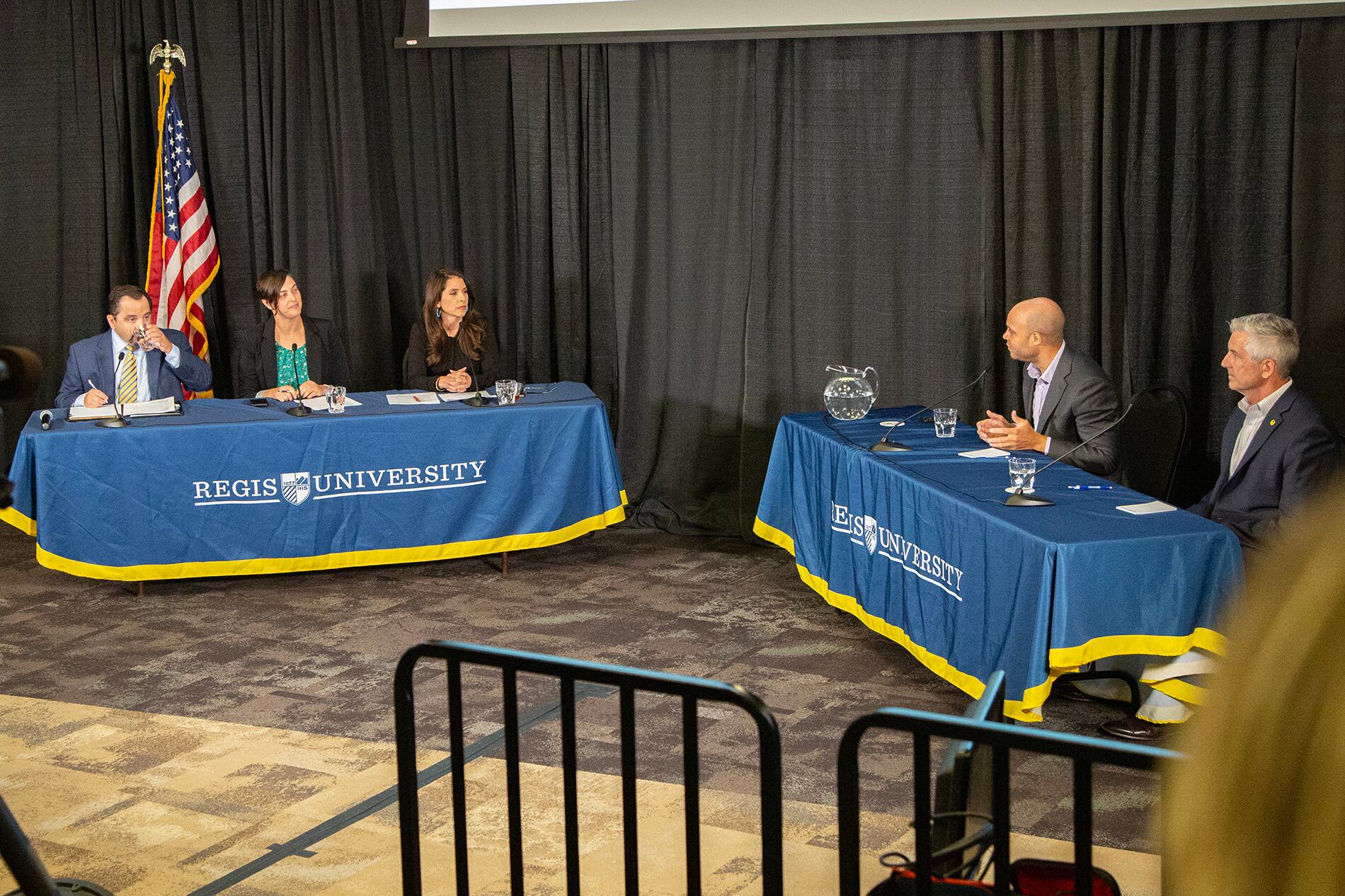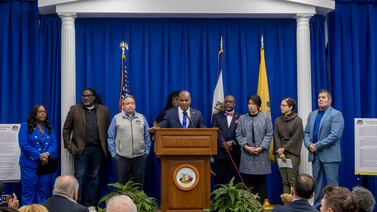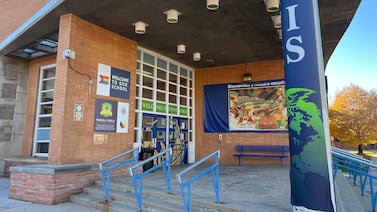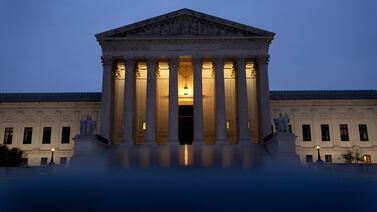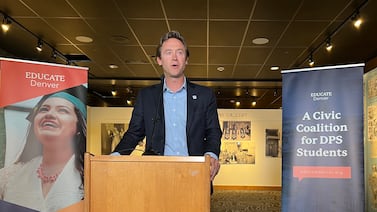Kwame Spearman and John Youngquist, who both are running for an at-large seat on the Denver school board, said police officers should not have been removed from Denver schools in 2020. Both also supported the decision to bring the officers back this year.
But Spearman said he’d like to see the police officers — which are known as school resource officers, or SROs — out of schools again in the next four years.
That was one key difference from a lively candidate debate last week at Regis University co-sponsored by Chalkbeat Colorado, CBS Colorado, Regis, and Educate Denver.
Spearman, a Denver Public Schools graduate and co-owner of the Tattered Cover bookstores, which recently filed for bankruptcy, and Youngquist, a DPS parent and former principal of East High School, are two of the three candidates in the race. The winner will replace board Vice President Auon’tai Anderson and represent the entire city.
The third candidate in the race, Brittni Johnson, did not attend the debate due to illness.
Three of the seven Denver school board seats are up for grabs Nov. 7. The election has the potential to shift the dynamics of the board, which has been criticized for infighting. It will also shape the district’s approach to school safety, declining enrollment, and other challenges.
Below, read some of what Spearman and Youngquist had to say at the debate, and watch the full 45-minute video. The candidates’ responses have been edited for length.
Do you agree with the board’s decision to reinstate police officers known as SROs in certain schools? Would you ever vote to remove them again, and under what circumstances?
Spearman: We should not have removed SROs in 2020 without any plan. It was a colossal mistake. I am supportive of having SROs in our schools right now.
But I’m the only candidate in the race that by the end of my first term, I actually want SROs out of our schools. And the way that we get there is we need to change our discipline matrix right now. We need to have alternative schools.
Right now we’re in a situation in which we have students who need education but maybe not in the schools that we categorize as our traditional schools. By the end of my first term, we’re going to have community officers in our schools to help us move forward.
Youngquist: I’ve been a principal in schools that have had SROs and those that have not had SROs. And I believe there are ways to make schools safe either way.
I agree fully with the decision that the board made to bring the SROs back. I was one of 17 principals three years ago that wrote a letter to the board of education asking them not to take SROs out of schools because they did not have a plan.
Right now, SROs will continue to be a part of that plan. Over time, we need to ensure we develop an understanding of how they best fit in our schools and where it is that we’re gaining value from them with a full complement of mental health and safety services.
As measured by standardized tests, DPS is serving white students better than it’s serving Black and Latinx students. What can the board do to better serve Black and Latinx students?
Youngquist: To better serve Black and Latinx students in the Denver Public Schools, we need to acknowledge that they don’t feel welcome in our schools and in our classrooms as much as we need for them to be. We need to acknowledge that we don’t prioritize the most experienced teachers to be in our classrooms with Black or Latino students.
We need to acknowledge that we are not yet good enough with our instructional practices to accelerate the learning of our Black and Latinx students.
And what we have to do is what the district did not do with their most recent annual report. When you look at that report, our district used aggregate data to take a look at how we’re doing across the district. And it looks like we’re doing fine … because we failed to disaggregate the data, which will allow us to begin to understand really how bad we are and some of the places and how much work we need to do to be great for our Latinx and our Black learners.
Spearman: If you’re a white student in Denver Public Schools, we are the second highest performing school district in the entire state. The gap between our white, Black, and Latino students is 43% [meaning 43 percentage points between the percent of white students and the percent of Black and Latino students scoring at grade level on standardized tests].
We’ve got to understand what’s working for our white students, because actually, we should applaud that. And what I think is working is it’s access to choice. It’s different educational environments. Parents, lo and behold, when they get to decide what is the right environment for their kid, their kid learns more, performance goes up.
We need to give our Black and Latino students the same access. The way that we do that is we’ve got to have great [schools] in every [neighborhood].
The school board has been criticized as dysfunctional, and polls have shown low confidence in its ability to govern. What changes would you propose to how the board does business?
Spearman: I think those polls are, by and large, talking about one member of the school board.
I’ve had the opportunity to meet with our school board members, and here’s what I can tell you: They care about our students, they care about our teachers, they’re trying to get us to the right place. But we do need new leadership, and I plan to be there.
The one thing that we’ve got to do is we’ve got to have a compelling vision. I think as far as safety, we’ve got to talk about what we aspire to get to. We are in a crisis of confidence right now. And of course, if people don’t feel comfortable or safe sending their kids to school, we’re going to lose board support. But once again, I believe that the night is darkest before the dawn, and that we are going to rally the community back together.
Youngquist: I am interested in seeing a board of education that is not invested so deeply into two things. One is individual interests that are ruling the day. And then a kind of groupthink that leads to inaction, that we cannot get our ideas together and develop ideas so that we’re able to secure an understanding of what our next actions are going to be.
So I would propose, most certainly, that we have significant change on this board. I don’t believe it’s just one person. I believe it is a context and a culture that’s been developed over time. And we need to make certain that we engage the leadership immediately that allows us to take the kind of turn and change over the course of the next several months where we have direction and we’re taking steps toward a focus on safety and student learning.
Watch the entire debate below or see it here.
Melanie Asmar is a senior reporter for Chalkbeat Colorado, covering Denver Public Schools. Contact Melanie at masmar@chalkbeat.org.

